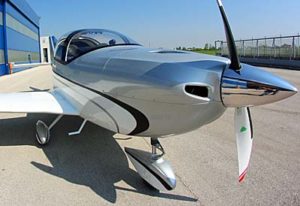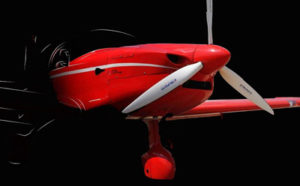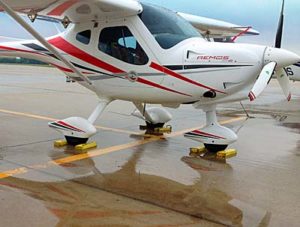
Tecnam’s handsome Astore helped celebrate the company’s 65th anniversary in business.
The number of inquiries or comments I have received compels me to speak to this subject. Several readers or viewers asked variations on this question, “Will this have an adverse effect on Light-Sport Aircraft?” I’ll offer my response and then add some other comments.
Aviation medical reform is nearly complete (BasicMed becomes effective May 1st). Many pilots may be waiting to qualify. Most need only to fulfill the requirement for an online evaluation every two years (free from AOPA) plus needing to see a doctor every four. If they did not earn a third class medical in the last 10 years, they must get that out of the way first. This is potentially a big problem as many let their medical lapse for various reasons.
The good news: Light-Sport Aircraft or Sport Pilot-eligible kit aircraft trigger no such requirement.

The Airplane Factory’s Sling is available as a two-seat LSA or a 4-seat kit.
However, the appeal remains strong for a new LSA at an affordable price or a used LSA at a reduced cost. These roomy, up-to-date aircraft commonly have modern fuel-efficient engines, highly sophisticated equipment including glass panels, and feature low operating costs with performance to match many GA airplanes, albeit with two seats. Light kit aircraft offer broad customization at modest expense. All can be flown with no medical proof other than a valid driver’s license.
When the rule change was first proposed five years ago, LSA sales took a nose dive. That body blow to a young industry segment has long since been absorbed and pilots who want a late-model aircraft have been choosing from dozens of models that are now well-established in the market and boast good safety records.
Contrary to some naysayers, LSA has been a global success. Today, LSA and LSA-like aircraft represent well over 60,000 units worldwide with annual sales around 3,000 new units. That last figure is about triple the number of new Type Certified aircraft delivered annually, according to recent reports. Find more details on LSA around the world in this article.

Remos debuted their slick new GXiS model at AirVenture 2016.
“The ‘hoops’ put in by the FAA make [achieving BasicMed] anything but simple,” he added. “There are still checks, there are still evaluations that make this far more complex than the LSA medical we currently have.”
Eric summarized noting that, given those fresh “hoops,” LSA will not lose its appeal due to the medical changes for pilots.
“After reviewing the new requirements, the so-called relaxing of the medical for pilots, I am rather surprised at the pundits’ responses,” elaborated Eric. “This is not at all the same as the LSA rule. Indeed this is in some ways worse than what they have at the moment, in my opinion. You now have people who have to go to a doctor who will be unsure of what is really required and perhaps reluctant to sign off on a certificate that they know so little about.”
Eric suggested asking yourself these questions: “Will doctors unfamiliar with aviation be willing to sign off for aviation medicals? Will they be willing to take on the responsibility for this in light of the legal response, if it should occur (as it no doubt will) that a pilot has a medical issue while flying after seeing a regular doctor? I think that the positive thoughts expressed today by some might change when we recheck this in a few years. Time will tell.”
“The LSA rule is far better,” Eric concluded. “People should be made aware of this.”


Congress passed a law saying we can fly a plane with up to 6 seats, single engine.fixed gear, fixed pitch prop, up to 4,000 pound gross, with a driver’s license. What we got after the FAA was a more complicated medical. Yes we still have to have proof of a medical. You Cannot fly a Skyhawk without proof of a current medical. You cannot fly it using a driver’s license for a medical. Unfortunately, the FAA regulations are law, not what Congress passed. Once again the FAA got the gold mine and we got the shaft!
Interesting line: “FAA got the gold mine and we got the shaft!” You are not alone in thinking FAA managed to complicate this medical reform. On reflection, many of us remain amazed that a Sport Pilot certificate holder — or someone with a higher level certificate exercising Sport Pilot privileges — could use a drivers license to substitute for a medical. Like Part 103, one wonders if a no-medical Sport Pilot certificate would pass get through the bureaucracy these days? The whole SP/LSA rule was reportedly held up for at least two years allegedly because FAA’s legal people did not like the no-medical part, a fact made all the more amazing as medical related accidents are a statistically insignificant cause of any mishap.
Hi, Dan.
If a family doctor is unsure as to what is required of him/her in signing off on a BasicMed certificate he/she can easily state an all inclusive DISCLAIMER, something to the effect that doctor is only certifying that the patient is known to him/her to be in generally good health with no maladies, afflictions, or handicaps that would exclude applicant, in Doctor’s opinion, from safely exercising the duties of driving an automobile or piloting a small aircraft.
From all I have read, the BasicMed rule expects no more than that from a doctor.
I quite agree, Patrick, however, the kind of response you describe is what I’d expect from a private practice doctor, one who can make his or her own decisions. In a corporate setting — where many doctors have gone to cope with onerous regulatory paperwork and rules — the situation might be very different. I hope for good things but BasicMed is not what many expected. Consider this editorial from Plane & Pilot editor, Robert Goyer: https://www.planeandpilotmag.com/going-direct-basicmed-huge-disappointment/
Why not just use a doctor who does Avation medical to do your basic med?
[This comment was edited for clarity…]
Most doctors in the northeast U.S. don’t want any part of Basic Med including mine, so I go to a regular FAA doctor for an aviation medical.
The doctor says that of 340 patients the doctor’s group takes care of, they only have two pilots and the extra insurance for the two of us is voted down all time because they do not have enough pilots to offset the added expense.